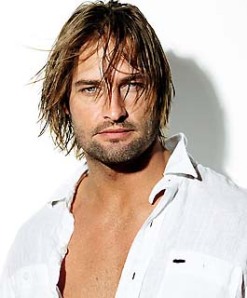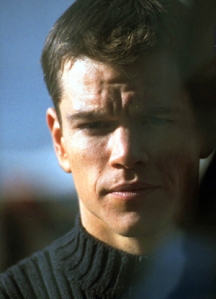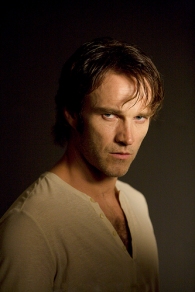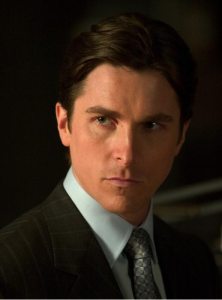Bad Guys: Is He or Isn’t He?
A con man stranded on a strange island. A cold-blooded assassin with a memory problem. A vampire in a small Louisiana town. A billionaire playboy wanting vengeance for his parents’ murder. What do these characters all have in common?
They’re all dark heroes.
“Dark heroes inhabit the dark side of life. This means they often have a sinister, brooding, or gloomy nature. It does not mean they need to be evil like villains do, although they can certainly have a range of less-than-desirable traits. They often have secrets, and they often have been wronged in the past. . . . The stories they appear in are often about how their faith in humanity needs to be restored” (Jessica Page Morrell, Bullies, Bastards & Bitches).
 When the TV series Lost started, the setup was clear: clean-cut spinal surgeon Jack was the hero; scruffy, chain-smoking, high-school dropout Sawyer was the bad guy. Or was he? As the series has progressed, we’ve seen sides of both of these men that have turned these notions on their heads. Sawyer called people names, hoarded necessary supplies, stole all the weapons, squished a cute little tree frog with his bare hand, and advocated the philosophy “Every man for himself” on more than one occasion. But he also got shot trying to keep the Others from taking Walt off the raft. He tried to protect Kate when they were in captivity on Hydra Island. He’s stepped up on multiple occasions to protect the other survivors. And he worries about and protects Hurley. We learn that Sawyer, a.k.a. James Ford, witnessed his father shoot his mother and then commit suicide while eight-year-old Sawyer hid under the bed. From this event, Sawyer burned with the desire to kill the man who’d seduced his mother and swindled her out of their family’s life savings—leading to the murder/suicide. And then, in a cruel twist of irony, became the same kind of con man as the man he hunted. By the end of season five, Sawyer had long replaced Jack in the role of the leading man, the hero, on the show—at least in my opinion. Yet Sawyer’s still dark, brooding, and has his hangups when it comes to being the “good guy” all the time. While we’ve seen he has he ability to be good, we know that his bad-guy tendencies are there, just below the surface.
When the TV series Lost started, the setup was clear: clean-cut spinal surgeon Jack was the hero; scruffy, chain-smoking, high-school dropout Sawyer was the bad guy. Or was he? As the series has progressed, we’ve seen sides of both of these men that have turned these notions on their heads. Sawyer called people names, hoarded necessary supplies, stole all the weapons, squished a cute little tree frog with his bare hand, and advocated the philosophy “Every man for himself” on more than one occasion. But he also got shot trying to keep the Others from taking Walt off the raft. He tried to protect Kate when they were in captivity on Hydra Island. He’s stepped up on multiple occasions to protect the other survivors. And he worries about and protects Hurley. We learn that Sawyer, a.k.a. James Ford, witnessed his father shoot his mother and then commit suicide while eight-year-old Sawyer hid under the bed. From this event, Sawyer burned with the desire to kill the man who’d seduced his mother and swindled her out of their family’s life savings—leading to the murder/suicide. And then, in a cruel twist of irony, became the same kind of con man as the man he hunted. By the end of season five, Sawyer had long replaced Jack in the role of the leading man, the hero, on the show—at least in my opinion. Yet Sawyer’s still dark, brooding, and has his hangups when it comes to being the “good guy” all the time. While we’ve seen he has he ability to be good, we know that his bad-guy tendencies are there, just below the surface.
 He was found floating in the ocean, shot in the back. When he regains consciousness, he has no idea who he is. But two things are sure: he knows how to kill and he knows how to survive. Thus is the beginning of the Jason Bourne trilogy (at least the movies, I’ve never read the books). Jason is a man without a past—and without a future if whoever’s hunting him has their way—but he uses the skills programmed into him to try to piece together the life that was stolen from him. Or was it? Was he forced into the life of an assassin or did he volunteer for this and take on the job of a Black Ops operative knowing full-well it would mean killing for a living? Before Jason figures out what Treadstone—the Black Ops group—is and what he’d done for them, we see his definite hero tendencies. That is, until he starts kicking some butt to try to get to the truth of who he is.
He was found floating in the ocean, shot in the back. When he regains consciousness, he has no idea who he is. But two things are sure: he knows how to kill and he knows how to survive. Thus is the beginning of the Jason Bourne trilogy (at least the movies, I’ve never read the books). Jason is a man without a past—and without a future if whoever’s hunting him has their way—but he uses the skills programmed into him to try to piece together the life that was stolen from him. Or was it? Was he forced into the life of an assassin or did he volunteer for this and take on the job of a Black Ops operative knowing full-well it would mean killing for a living? Before Jason figures out what Treadstone—the Black Ops group—is and what he’d done for them, we see his definite hero tendencies. That is, until he starts kicking some butt to try to get to the truth of who he is.
 Bill Compton has returned to Bon Temps, Louisiana, to his family home. The home he lived in with his wife and children until 1865—when he was turned into a vampire on his way home from fighting in the Civil War. Now, it’s 2009 and vampires have been allowed to “come out” into society due to the invention of “Tru Blood,” a synthetic blood that gives them the same nutritional support as actual human blood (though apparently doesn’t taste good). Bill wants to rejoin mainstream life, to try to live on Tru Blood so he doesn’t have to kill anymore. He even falls in love (though I don’t understand why) with Sookie Stackhouse, a human waitress at the local bar/restaurant. But when Sookie’s life is threatened, that’s when we get to see that Bill is definitely a vampire through-and-through. There’s a sinister edge to his character—one that is somewhat unsettling. Because even though we know he’s trying to be a good guy, what he is, in his very core, is something dark and dangerous. (And I’ve only watched Season One, so no spoilers in the comments, please!)
Bill Compton has returned to Bon Temps, Louisiana, to his family home. The home he lived in with his wife and children until 1865—when he was turned into a vampire on his way home from fighting in the Civil War. Now, it’s 2009 and vampires have been allowed to “come out” into society due to the invention of “Tru Blood,” a synthetic blood that gives them the same nutritional support as actual human blood (though apparently doesn’t taste good). Bill wants to rejoin mainstream life, to try to live on Tru Blood so he doesn’t have to kill anymore. He even falls in love (though I don’t understand why) with Sookie Stackhouse, a human waitress at the local bar/restaurant. But when Sookie’s life is threatened, that’s when we get to see that Bill is definitely a vampire through-and-through. There’s a sinister edge to his character—one that is somewhat unsettling. Because even though we know he’s trying to be a good guy, what he is, in his very core, is something dark and dangerous. (And I’ve only watched Season One, so no spoilers in the comments, please!)
 When he was a small child, Bruce Wayne’s parents were murdered before his very eyes. The weight of this trauma—the guilt it induces as well as the fact he never moves beyond the anger stage of grief—seethes and grows within Bruce’s psyche until one day, he puts on a bunch of black eye makeup, dons a suit of black body-armor, a cape, and a bat-ear-adorned helmet and turns his pain and psychological turmoil outward in the name of cleaning up the streets of Gotham. He is above, around, over, beside, and under the law, but rarely within it. He does what good, law-upholding Sgt./Lt./Commissioner Gordon cannot. “He’s the hero Gotham deserves, but not the one it needs right now. So we’ll hunt him because he can take it. Because he’s not our hero. He’s a silent guardian, a watchful protector. A dark knight.”
When he was a small child, Bruce Wayne’s parents were murdered before his very eyes. The weight of this trauma—the guilt it induces as well as the fact he never moves beyond the anger stage of grief—seethes and grows within Bruce’s psyche until one day, he puts on a bunch of black eye makeup, dons a suit of black body-armor, a cape, and a bat-ear-adorned helmet and turns his pain and psychological turmoil outward in the name of cleaning up the streets of Gotham. He is above, around, over, beside, and under the law, but rarely within it. He does what good, law-upholding Sgt./Lt./Commissioner Gordon cannot. “He’s the hero Gotham deserves, but not the one it needs right now. So we’ll hunt him because he can take it. Because he’s not our hero. He’s a silent guardian, a watchful protector. A dark knight.”
So what have we learned about dark heroes from these four examples?
- Alpha Male (or Female, if it’s a dark heroine)
- An Outsider/Outcast—someone who has either done something to get himself cast out of society or who has decided to cast off society
- Usually selfish/self-serving and a self-persevationist
- Angry, cynical, haughty
- Scarred by some trauma in his past
- Isn’t really as bad deep down as he tries to look on the outside
- Isn’t living up to his potential
- Broods, a lot (serious or pained expressions)
- Wears his inner turmoil on his sleeve
- Has a tendency to ignore the law/society’s rules whenever they constrain him
- Can’t help but be affected by the bad things he’s really fighting against
- Doesn’t see anything wrong with vigilantism
- Has an ambiguous code of morals/ethics
- Has lots of unresolved issues in his life
- Will never be completely redeemed/redeemable (unlike his close relation, the “bad boy”)
For Discussion
What can a Dark Hero (Heroine) add to a story that a traditional “white hat” hero can’t? If a dark hero can never be fully redeemed or isn’t fully redeemable, can his story ever be completely resolved? From this list and these examples, what are the distinctions you would draw between a rake/bad-boy character and a dark hero?
Comments are closed.

I think a dark hero creates sympathy, we want him to be good, to succeed, to get justice, be loved. It can elicit desire for the heroine to see these things happen, and hopefully for the reader. For the “white hat” hero these things are almost expected, but with the dark hero we are kept wondering, hoping. I think it depends on the story itself if the dark hero has his story resolved. I’ve seen them redeemed fully and sometimes just certain aspects resolved, but the story had a satisfactory ending even so.
A rake is bad, a dark hero just thinks he’s bad.
LikeLike
By the way, my oldest son looks so much like Matt Damon it’s scary: http://carlaspathways.wordpress.com/2007/07/
LikeLike
I think that dark heroes are sometimes more loved by the reader/audience/etc. because they’re human. Like Carla said, with the white-hat guy, it’s expected. Oh, blah-blah. No struggle, you knew he was going to do it, big deal. But with the “other guy”, it’s more interesting to see him struggling to decide what’s right, and we cheer for him…and love him even when he fails to do it.
The rake usually is just plain unloveable period. You love to hate him. Never, ever like him. Period.
LikeLike
Forgot to add that to me, the only difference between a dark hat and a bad boy-turned-good-in-the-end is just that…one is redeemed in the end.
LikeLike
LOST spoilers
*
*
*
*
*
You’ve been warned
*
*
*
I haven’t watched the other shows you listed, but Sawyer/James is one of the most intriguing characters I’ve seen on TV in years. His character arc is what’s kept me coming back the last couple of years to watch LOST, and the reason I’ll tune in for the last season. I can tell the writers love his character. I could see Jack’s fall coming a mile away, but I didn’t see Sawyer’s transformation coming. Not in the way it did. I love being surprised.
In the situation James is in, the fact that he does have that dark side… well, I see it as a strength. In such whacked out circumstances as this group of people face week to week, they need a leader who has what it takes to make some horrendous decisions and then take what action necessary to follow them through, for the sake of survival, or whatever is top priority in that particular episode. He’s a reluctant leader, but it seems he just can’t help himself. I love that.
Now, put James in a normal, go-to-work-mon-fri and cut-the-grass-on-the-weekend life, and I don’t think he’d fare too well. If he didn’t have trouble to face and conquer, I think he’d end up creating it for himself. Sigh.
This is a great series. Thank you Kaye for all the time and energy you put into this blog. It’s one of the best writing blogs I’ve read.
LikeLike
I can’t speak for LOST or Tru Blood and really not a huge fan of the Batman, but as for Jason Bourne, I have read the books as well as own the movies, his “badness” and some what dark heroism stirs what lys beneath my surface. All of us have some trauma in our life, some sens of needing redemention and characters like Bourne allow us to identify with a hero even when most of the time we don’t feel like one. That deep desire to be the “good guy” but struggling to know how to or understand how to be that is what appeals to these dark heros….in my laymans opinion.
Kaye, I’ll bring you the books. They are awesome!
LikeLike
I LOVE your blog.
Anyway.
A dark hero…the first character that comes to mind would be Mr. Rocherstor from Jane Eyre. He has a dark past, is traumatized by it, and this past becomes his stumbling block to redemption. The charm in writing about these troubled men is that it makes females feel as if they have the power to change them, to “reform” them.
LikeLike